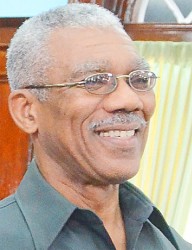Opposition leader David Granger yesterday said APNU will not be supporting the amendments to the Anti-Money Laundering and Countering the Financing of Terrorism Act, after announcing the coalition’s withdrawal from the parliamentary review of the proposed changes over being kept in the dark about the reform process.
With the AFC already indicating that it will withhold support for the amendment bill unless the government sets up the Public Procurement Commission and President Donald Ramotar assents to two opposition-piloted bills passed earlier this year, the withholding of APNU’s support would leave the government unable to pass the bill when it returns to the floor for debate and third reading in the House.
“At the present time, APNU has not found any reason to give this bill its support,” Granger, also leader of APNU, told Stabroek News.
“I did write to the President concerning the fact that as early as April 10th he did receive a letter from the Caribbean Financial Action Task Force (CFATF).

He was asked to bring some information to the leader of the opposition and also to the general opposition members. This had not been done,” he said. “The result is that we were not given the opportunity to examine in detail the recommendations of the task force and that would have helped us in understanding the predicament that Guyana finds itself in,” he added.
The bill was sent to a parliamentary select committee on May 7, although the government had been told of the steps it had to implement to become compliant in terms of its anti-money laundering legislation almost a year earlier.
The concerns and recommendations made in a report of the CFATF centred on the fact that Guyana’s Financial Intelligence Unit (FIU) had only one staff member and the government was reluctant to have the unit give periodic reports. The CFATF pointed out that the lack of training for staff members that make up the front line agencies expected to investigate money laundering coupled with their small wages could foster corruption.
Guyana faces a deadline of May 27, 2013, after which sanctions will be imposed for failing to pass legislation to address the key concerns of the CFATF.
“We in APNU were quite disappointed that we had not seen the report prior to last week and we were not involved in [any] discussion with the government to determine the position of Guyana as a nation. It is not a party matter it is a national matter,” said Granger yesterday.
“We found it very difficult to continue participating when we were deprived of the type of information that we needed to inform us about the ramification of Guyana’s position concerning money laundering,” he added.
“At the present time, we have not been able to lend our support to the process. The process itself—not only the amendments to the money laundering bill but the process itself is now damaged by the PPP/C,” he said.
“The government is sleepwalking into a financial catastrophe because they were aware of all of these implications and ramifications long ago.
This is not a surprise. There is a matter of grey listing and blacklisting and the government is aware that the international community is not going to judge it on the basis of one single legislative act, the government is going to be judged on implementation and performance and that is where the government has been found wanting,” he said.
Granger said that with regard to the Public Procurement Commis-sion (PPC), this remains a concern and does not reconcile with government’s thrust of being all for openness and transparency.
“Similarly, the actual structure of the Financial Intelligence Unit in the staffing and the work that it is supposed to do [remain unsatisfactory],” he said.
“It is the government that has been delinquent on this matter over a long period of time.
So it is farcical to give the public the impression that the two opposition parties are behaving in an anti-national way when it is the government which has shown no interest in implementing these measures for a long period of time,” he said.
Government had been counting on the support of the APNU in the light of the AFC’s pre-conditions for giving its support to the bill.
Speaking on behalf of the AFC, party leader Khemraj Ramjattan said the bill must be able to withstand scrutiny before it could be passed. Ramjattan raised the issue of government’s non-implementation of the PPC and gave an indication that the party would want to share its concerns on this with the CFATF.





